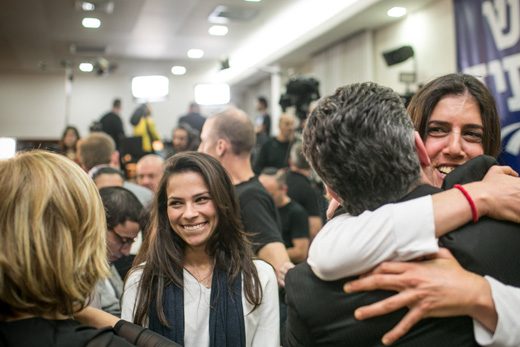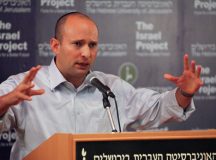Yesh Atid have brought a reforming passion to Israeli politics. Yair Lapid and his party are prepared for the long haul.
So, who is Yair Lapid and why did his party, Yesh Atid, win big on January 22?
Born in Tel Aviv in 1963, he began his career in journalism as a military correspondent for the IDF’s weekly magazine, BaMachane(In the Camp), continuing as a correspondent for Maariv. In 1988 he was appointed editor of a Tel Aviv paper published by the Yedioth Ahronoth group before starting his hugely popular weekly column in the Maariv weekend supplement in 1991.
In the 1990s, Yair branched out into television. He began to host Channel 2’s popular Friday night news magazine, Ulpan Shishi, in 2008. His writings include a best-selling memoir of his father, the former deputy Prime Minister Joseph ‘Tommy’ Lapid, and a TV drama series called ‘War Room.’
On January 8, 2012 Lapid announced that he was leaving journalism to enter politics. Four months later, on April 30, 2012 he registered a new political party, Yesh Atid (There is a Future).
From the outset, Yesh Atid was focused on the need for the radical reform of Israeli society. As the party’s campaign slogan stated, ‘We have come to bring about change.’
Yesh Atid won big on January 22, securing an astonishing nineteen mandates to become the second largest party in the Knesset only one year after its formation, because it proposed practical solutions to five key issues.
The first reform we proposed is equality in national service. At the moment, the ultra-Orthodox community does not serve in the military and offers its young people a limited school curriculum. The result is that the community has difficulty joining the workforce and sharing the burden. Yesh Atid has a plan for everyone to either serve in the military or do national service. This demand played a large role in the party’s success in January’s poll.
The second reform we campaigned for was an overhaul in education. Yesh Atid plans to implement government decisions which have been ignored, such as longer school days for all students. We seek to reduce class sizes, give the schools back to principals and teachers instead of bureaucrats, and create technological high schools for students who cannot thrive in the traditional system. The ultimate goal is to return Israel to the world’s elite in education.
Young Israel’s have a difficult time purchasing homes and Yesh Atid’s third reforming proposal was to build 150,000 low cost rental apartments on government-owned land. In addition, the party proposes that government subsidies for home purchases favor those who serve and work.
Middle class Israel has been suffering. Two hard working spouses still struggle towards the end of the month. Yesh Atid is a centrist party which is not obligated to the tycoons on one side or the unions on the other. It intends to fight to lower monthly utility bills by taking on the special-interests. Our economic plan does not require increasing the national budget; it encourages growth while changing the priorities to provide the Israeli middle class with employment, housing and an improved quality of life.
Finally, Yesh Atid seeks to change what it has described as Israel’s ‘oversized, wasteful and sectarian government’ by raising the election threshold from 2 per cent to 6 per cent, legislating that the government can have a maximum of eighteen ministers, and by insisting that Yesh Atid MKs take a pledge not to serve as ministers without portfolio.
In addition to this focus on internal issues, Yesh Atid seeks progress on the Palestinian front and the two state solution.
In his policy speech on this topic during the election campaign, Lapid stated that ‘I state here, that the “Yesh Atid” party will not sit in a government which does not return to the political negotiating table. We will not sit in a government that again tries to dissolve – with different excuses, and with narrow political motives – our commitment to our future and also to our present.’
Lapid is fully aware of the scale of the challenge. ‘We need to return to the table despite the difficulties, despite the knowledge that it is hard to trust the Palestinians, and despite the fact that it will awaken disagreement in Israeli society.’ He points out that ‘even after we return to the table, the negotiations will not take a week, they will not take a month, but they will take months and maybe years because we need to conduct them with caution and with strict protection of Israel’s interests. But we need to conduct them without a break until we reach an agreement.’
He is no dove. ‘Do not misunderstand me: I am the last one who thinks that Israel alone is to blame for the current political situation. If following the Disengagement the Palestinians did not build hospitals and schools on the ruins of Gush Katif, but instead established training areas for the Hamas and began to fire Qassam rockets and mortars on residents of the South, they can only blame themselves for the fact that we don’t trust them.’
But he seeks a pro-active Israeli approach. ‘Despite the lack of trust and while taking it into account, we cannot remove striving for a peace agreement from our daily agenda. This is because it is in Israel’s interest.’
Yesh Atid’s nineteen mandates have made it the second largest party in the Knesset, and brought a freshness to Israeli politics. Citizens are filled with hope for a better future and excitement about this new leader, Yair Lapid. He and his party arrive in the Knesset prepared for the long haul.





































